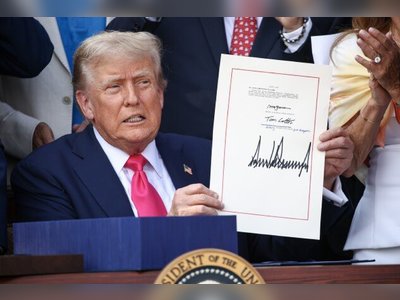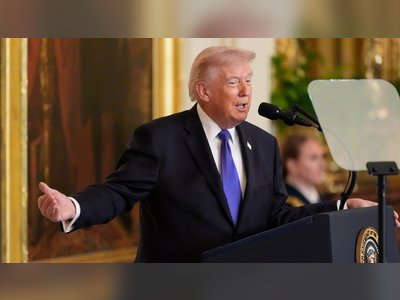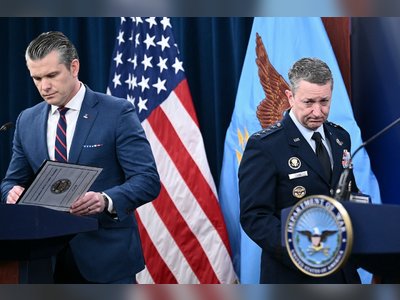UK Foreign Secretary David Lammy Dismisses Trump's Greenland Seizure Threat
David Lammy assures that US military action in Greenland is unlikely, as differences with Trump emerge over NATO spending and international security concerns.
David Lammy, the UK Foreign Secretary, has dismissed any likelihood of a US military acquisition of Greenland, allaying concerns raised by former US President Donald Trump’s threats to seize the territory from Denmark.
In a series of interviews ahead of a major speech, Lammy emphasized that 'no NATO countries have gone to war with each other since the establishment of NATO, and I do not envisage that,' adding, 'It is not going to happen.'
Lammy’s comments, designed to reassure allies and explain subtle disagreements with the Trump administration, underscored the challenges that lie ahead for the Labour government in managing an independent foreign policy while maintaining strong ties with an assertive US administration.
During his first term, Donald Trump made news with his unpredictable rhetoric regarding international alliances and defense policy, stirring unease among NATO members.
Despite Trump's provocative language, he reinforced military commitments, increasing US troop deployments in Europe and supplying defensive weapons to Ukraine.
The situation in Greenland highlights Trump's focus on Arctic geopolitics, worried about the rising influence of Russia and China.
Lammy indicated the matter boiled down to concerns over US national security and the recognition that 'Greenland is a kingdom of Denmark.'
On the question of defense spending, Trump proposed raising NATO targets to 5% of GDP, a significant increase from the existing 2% benchmark.
Lammy acknowledged the need for greater investment in defense but noted, 'The United States is at 3.38% of GDP, so I assume that he would set out a roadmap to get to that 5%.'
European security remains a foremost concern.
Lammy asserted no evidence suggested Russian President Vladimir Putin was prepared to earnestly negotiate, even though Trump was perceived as eager for deals.
Recent intelligence suggests a pivot in diplomatic timelines to Easter, with immediate focus directed towards supporting Ukraine through the winter months.
Lammy also confronted potential US-China relations, encouraging Beijing not to ally too closely with Moscow.
His disclosures about Beijing's ongoing involvement in supply chains supporting Russia stress the UK’s commitment to pressuring China diplomatically.
He emphasized the importance of direct engagement, noting, 'When I was in Beijing, I made it clear that the dual-use technology flowing to Russia is being used to kill troops in Ukraine.'
Finally, Lammy stood firm against the US call for the repatriation of Shamima Begum, a British-born individual who joined the Islamic State.
Rejecting the appeal put forth by Trump’s team for her return, he stated, 'Shamima Begum will not be coming back to the UK...
She’s not a UK national.
We will act in our security interests.'
The interactions between Lammy and the Trump administration highlight ongoing discussions on NATO commitments, international territorial integrity, and global security dilemmas.
As the UK navigates these complex diplomatic waters, the emphasis remains on both assessing the concerns of its closest ally and asserting its own strategic positions.
In a series of interviews ahead of a major speech, Lammy emphasized that 'no NATO countries have gone to war with each other since the establishment of NATO, and I do not envisage that,' adding, 'It is not going to happen.'
Lammy’s comments, designed to reassure allies and explain subtle disagreements with the Trump administration, underscored the challenges that lie ahead for the Labour government in managing an independent foreign policy while maintaining strong ties with an assertive US administration.
During his first term, Donald Trump made news with his unpredictable rhetoric regarding international alliances and defense policy, stirring unease among NATO members.
Despite Trump's provocative language, he reinforced military commitments, increasing US troop deployments in Europe and supplying defensive weapons to Ukraine.
The situation in Greenland highlights Trump's focus on Arctic geopolitics, worried about the rising influence of Russia and China.
Lammy indicated the matter boiled down to concerns over US national security and the recognition that 'Greenland is a kingdom of Denmark.'
On the question of defense spending, Trump proposed raising NATO targets to 5% of GDP, a significant increase from the existing 2% benchmark.
Lammy acknowledged the need for greater investment in defense but noted, 'The United States is at 3.38% of GDP, so I assume that he would set out a roadmap to get to that 5%.'
European security remains a foremost concern.
Lammy asserted no evidence suggested Russian President Vladimir Putin was prepared to earnestly negotiate, even though Trump was perceived as eager for deals.
Recent intelligence suggests a pivot in diplomatic timelines to Easter, with immediate focus directed towards supporting Ukraine through the winter months.
Lammy also confronted potential US-China relations, encouraging Beijing not to ally too closely with Moscow.
His disclosures about Beijing's ongoing involvement in supply chains supporting Russia stress the UK’s commitment to pressuring China diplomatically.
He emphasized the importance of direct engagement, noting, 'When I was in Beijing, I made it clear that the dual-use technology flowing to Russia is being used to kill troops in Ukraine.'
Finally, Lammy stood firm against the US call for the repatriation of Shamima Begum, a British-born individual who joined the Islamic State.
Rejecting the appeal put forth by Trump’s team for her return, he stated, 'Shamima Begum will not be coming back to the UK...
She’s not a UK national.
We will act in our security interests.'
The interactions between Lammy and the Trump administration highlight ongoing discussions on NATO commitments, international territorial integrity, and global security dilemmas.
As the UK navigates these complex diplomatic waters, the emphasis remains on both assessing the concerns of its closest ally and asserting its own strategic positions.












